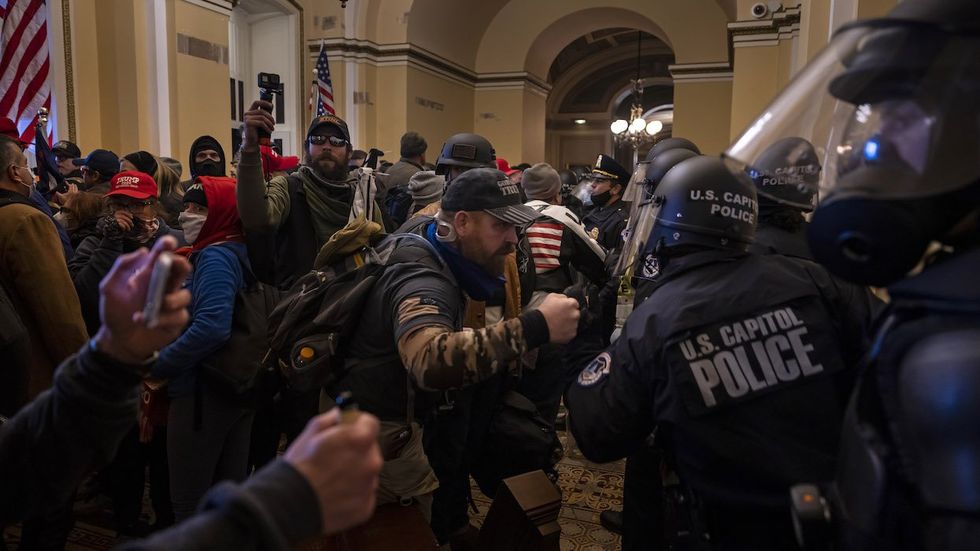Jessica Watkins, a transgender Army veteran who joined the far-right extremist group the Oath Keepers, was sentenced to more than eight years in prison on Friday for her role in in the January 6 insurrection.
The judge in the case, U.S. District Judge Amit Mehta, said that while Watkins had apologized for her participation in the attack on the U.S. Capitol, Watkins’s efforts were still “aggressive” and Watkins wasn’t initially remorseful for her actions.
“Your role that day was more aggressive, more assaultive, more purposeful than perhaps others’. And you led others to fulfill your purposes,” Mehta said, CNN reports. “And there was not in the immediate aftermath any sense of shame or contrition, just the opposite. Your comments were celebratory and lacked a real sense of the gravity of that day and your role in it.”
Watkins founded an Ohio militia and coordinated with the Oath Keepers. They went to Washington, D.C., in riot gear, and urged others to attack the Capitol on January 6.
Before being sentenced, Watkins said, “I was just another idiot running around the hallway.”
She added, “But idiots are responsible, and today you are going to hold this idiot responsible.”
Co-defendants Steward Rhodes and Kelly Meggs were sentenced the day before to 18 and 12 years in prison respectively. They were convicted of seditious conspiracy.
Watkins was acquitted on sedition charges but was convicted in November 2022 of conspiracy to obstruct an official proceeding — which has a 20-year maximum like a seditious conspiracy conviction. Watkins was also found guilty of obstruction of an official proceeding, interfering with law enforcement officers during a civil disorder, and conspiracy to prevent an officer from discharging duties.
While Mehta said Watkins’s role was not that of Rhodes or Meggs, “your role in those events is more than that of just. I think you can appreciate that.”
Prosecutors said Watkins wasn’t remorseful, citing prison calls where Watkins allegedly said “boo hoo the poor little police officers, got a little PTSD, waaaa, I had to stand there and hold a door open for people waaaaaa,” CNN reports.
The Army vet said during the trial that she often struggled with her transgender identity while “don’t ask, don’t tell” was in place. She said she eventually fell for conspiracy theory after conspiracy theory and became anxious and concerned about the U.S. government.
“I understand now that my presence in and around the Capitol that day probably inspired those individuals to a degree,” she said on Friday. “They saw us there and that probably fired them up. Oath Keepers are here, and they were patting us on the back.”
Watkins added, “How many people went in because of us? We’re responsible for that.”
“My actions and my behaviors that fateful day were wrong, and as I now understand, criminal,” she said, according to NBC News. “Violence is never the answer.”
Prosecutors said Watkins’s wasn’t the only one who struggled, and while prosecutors said the government sympathized with Watkins, they said “she does not have an excuse.”
“It is perhaps an unsurprising fact of human nature that those who are subjected to injustice occasionally bring injustice on others,” prosecutor Alexandra Hughes said, CNN reports. “We do not dispute what she has been through, but what she did on that day has deep and devastating – devastating – effects on individuals who showed up to work that day and never did anything to Jessica Watkins.”
Mehta referenced Watkins’s struggles with her identity in the sentencing.
“Your story itself shows a great deal of courage and resilience,” the judge said. “You have overcome a lot, and you are to be held out as someone who can actually be a role model for other people in that journey. And I say that at a time when people who are trans in our country are so often vilified and used for political purposes.”
Still, Mehta said, “It makes it all the more hard for me to understand the lack of empathy for those who suffered that day.”




















































































